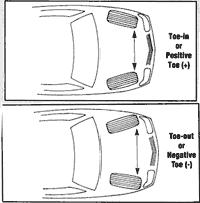
 |
|
Originally Posted by Shan2nu Well, if your steering alone feels light at high speeds, then you've got excess toe-out. Get the toe angles checked at a service station and get it set according you your style. BTW, is the car nimble on the twisties? Toe out helps get the car into corners but not very good at hgih speed stability. Shan2nu |
| Pardon my ignorance. What's a toe-out? |

|
Originally Posted by Shan2nu This will help you understand better. (img) Shan2nu |
|
Originally Posted by http://www.innerauto.com/Automotive_Definitions/Toe_In_And_Toe_Out_Tread_Wear/ Important in the ease of steering the car is the correct setting of toe-in. Toe-in is a term used to specify the amount (in fractions of an inch) that the front wheels are closer together in front that at the rear, when measured at hub height. Precision testing equipment and careful measurement and correction will prevent any slipping or scuffing action between the tires and the road. If toe-in is incorrect, the tires will be dragged along the road, scuffing and featheredging the treadribs. Changes in road or load conditions will affect more than one steering angle, and uneven tread wear patterns will result. Changes in road or load conditions will affect more than one steering angle, and uneven tread wear patterns will result. Also, toe-in will change when other angular adjustments are made. Because of this, front wheel toe-in should be measured first and uneven tread wear patterns corrected last on all wheel alignment jobs. Toe-out Tread Wear It is obvious that driving conditions make it impossible to keep the front wheels parallel at all times. Regardless of how accurately the front wheels are positioned for straight ahead driving, they could be out of their correct relative positions on turns. Considering that the outside wheel is approximately five feet farther away from the point about which the car is turning, it must turn at a lesser angle and travel in a greater circle than the inside wheel. This condition is called toe-out turns, which means that each front wheel requires a separate turning radius to keep the inside tire from slipping and scuffing on turns. Toe-out turns is the relationship between the front wheels which allows them to turn about a common center. To accomplish this, the steering arms are designed to angle several degrees inside of the parallel position. The exact amount depends on the tread and wheelbase of the car and on the arrangement of the steering control linkage. Unless toe-out is aligned correctly, the tires will have a scrubbing action on the road surface. This will produce a featheredge on the outer edges of the tread ribs. |
| after reading thi si dont feel that its the toe /toe out that causing problems. |
| All times are GMT +5.5. The time now is 05:39. |